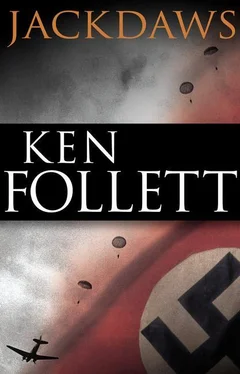Ken Follett - Jackdaws
Здесь есть возможность читать онлайн «Ken Follett - Jackdaws» весь текст электронной книги совершенно бесплатно (целиком полную версию без сокращений). В некоторых случаях можно слушать аудио, скачать через торрент в формате fb2 и присутствует краткое содержание. Жанр: Шпионский детектив, на английском языке. Описание произведения, (предисловие) а так же отзывы посетителей доступны на портале библиотеки ЛибКат.
- Название:Jackdaws
- Автор:
- Жанр:
- Год:неизвестен
- ISBN:нет данных
- Рейтинг книги:4 / 5. Голосов: 1
-
Избранное:Добавить в избранное
- Отзывы:
-
Ваша оценка:
- 80
- 1
- 2
- 3
- 4
- 5
Jackdaws: краткое содержание, описание и аннотация
Предлагаем к чтению аннотацию, описание, краткое содержание или предисловие (зависит от того, что написал сам автор книги «Jackdaws»). Если вы не нашли необходимую информацию о книге — напишите в комментариях, мы постараемся отыскать её.
Jackdaws — читать онлайн бесплатно полную книгу (весь текст) целиком
Ниже представлен текст книги, разбитый по страницам. Система сохранения места последней прочитанной страницы, позволяет с удобством читать онлайн бесплатно книгу «Jackdaws», без необходимости каждый раз заново искать на чём Вы остановились. Поставьте закладку, и сможете в любой момент перейти на страницу, на которой закончили чтение.
Интервал:
Закладка:
Paul was on Monty's personal staff. A lot of people thought this was because his father was a general, but that was an unfair assumption. Paul was comfortable with senior officers, partly because of his father, partly because before the war the U.S. Army had been the biggest customer for his business, which was making educational gramophone records, language courses mainly. He liked the military virtues of obedience, punctuality, and precision, but he could think for himself, too, and Monty had come to rely on him more and more.
His area of responsibility was intelligence. He was an organizer. He made sure the reports Monty needed were on his desk when he wanted them, chased those that came late, set up meetings with key people, and made supplementary inquiries on the boss's behalf.
He did have experience of clandestine work. He had been with the Office of Strategic Services, the American secret agency, and had served under cover in France and French-speaking North Africa. (As a child he had lived in Paris, where Pa was military attache at the U.S. Embassy.) Paul had been wounded six months ago in a shoot-out with the Gestapo in Marseilles. One bullet had taken off most of his left ear but harmed nothing other than his looks. The other smashed his right kneecap, which would never be the same again, and that was the real reason he had a desk job.
The work was easy, by comparison with living on the run in occupied territory, but never dull. They were planning Operation Overlord, the invasion that would end the war. Paul was one of a few hundred people in the world who knew the date, although many more could guess. In fact, there were three possible dates, based on the tides, the currents, the moon, and the hours of daylight. The invasion needed a late-rising moon, so that the army's initial movements would be shrouded in darkness, but there would be moonlight later, when the first paratroopers jumped from their planes and gliders. A low tide at dawn was necessary to expose the obstacles Rommel had scattered on the beaches. And another low tide before nightfall was needed for the landing of follow-up forces. These requirements left only a narrow window: the fleet could sail next Monday, June 5, or on the following Tuesday or Wednesday. The final decision would be made at the last minute, depending on the weather, by the Allied Supreme Commander, General Eisenhower.
Three years ago, Paul would have been desperately scheming for a place in the invasion force. He would have been itching for action and embarrassed at being a stay-at-home. Now he was older and wiser. For one thing, he had paid his dues: in high school he had captained the side that won the Massachusetts championship, but he would never again kick a ball with his right foot. More importantly, he knew that his organizational talents could do more to win the war than his ability to shoot straight.
He was thrilled to be part of the team that was planning the greatest invasion of all time. With the thrill came anxiety, of course. Battles never went according to plan (although it was a weakness of Monty's to pretend that his did). Paul knew that any error he made-a slip of the pen, a detail overlooked, a piece of intelligence not double-checked-could kill Allied troops. Despite the huge size of the invasion force, the battle could still go either way, and the smallest of mistakes could tip the balance.
Today at ten a.m. Paul had scheduled fifteen minutes on the French Resistance. It was Monty's idea. He was nothing if not a detail man. The way to win battles, he believed, was to refrain from fighting until all preparations were in place.
At five to ten, Simon Fortescue came into the model room. He was one of the senior men at MI6, the secret intelligence department. A tall man in a pin-striped suit, he had a smoothly authoritative manner, but Paul doubted if he knew much about clandestine work in the real world. He was followed by John Graves, a nervous-looking civil servant from the Ministry of Economic Warfare, the government department that oversaw SOE. Graves wore the Whitehall uniform of black jacket and striped gray pants. Paul frowned. He had not invited Graves. "Mr. Graves!" he said sharply. "I didn't know you had been asked to join us."
"I'll explain in a second," Graves said, and he sat down on a schoolboy bench, looking flustered, and opened his briefcase.
Paul was irritated. Monty hated surprises. But Paul could not throw Graves out of the room.
A moment later, Monty walked in. He was a small man with a pointed nose and receding hair. His face was deeply lined either side of his close-clipped mustache. He was fifty-six, but looked older. Paul liked him.
Monty was so meticulous that some people became impatient with him and called him an old woman. Paul believed that Monty's fussiness saved men's lives.
With Monty was an American Paul did not know. Monty introduced him as General Pickford. "Where's the chap from SOE?" Monty snapped, looking at Paul.
Graves answered, "I'm afraid he was summoned by the Prime Minister, and sends his profound apologies. I hope I'll be able to help.."
"I doubt it," Monty said crisply.
Paul groaned inwardly. It was a snafu, and he would be blamed. But there was something else going on here. The Brits were playing some game he did not know about. He watched them carefully, looking for clues.
Simon Fortescue said smoothly, "I'm sure I can fill in the gaps."
Monty looked angry. He had promised General Pickford a briefing, and the key person was absent. But he did not waste time on recriminations. "In the coming battle," he said without further ado, "the most dangerous moments will be the first." It was unusual for him to speak of dangerous moments, Paul thought. His way was to talk as if everything would go like clockwork. "We will be hanging by our fingertips from a cliff edge for a day." Or two days, Paul said to himself, or a week, or more. "This will be the enemy's best opportunity. He has only to stamp on our fingers with the heel of his jackboot."
So easy, Paul thought. Overlord was the largest military operation in human history: thousands of boats, hundreds of thousands of men, millions of dollars, tens of millions of bullets. The future of the world depended on the outcome. Yet this vast force could be repelled so easily, if things went wrong in the first few hours.
"Anything we can do to slow the enemy's response will be of crucial importance," Monty finished, and he looked at Graves.
"Well, F Section of SOE has more than a hundred agents in France-in fact, virtually all our people are over there," Graves began. "And under them, of course, are thousands of French Resistance fighters. Over the last few weeks we have dropped them many hundreds of tons of guns, ammunition, and explosives."
It was a bureaucrat's answer, Paul thought; it said everything and nothing. Graves would have gone on, but Monty interrupted with the key question: "How effective will they be?"
The civil servant hesitated, and Fortescue jumped in. "My expectations are modest," he said. "The performance of SOE is nothing if not uneven."
There was a subtext here, Paul knew. The old-time professional spies at MI6 hated the newcomers of SOE with their swashbuckling style. When the Resistance struck at German installations they stirred up Gestapo investigations which then sometimes caught MI6's people. Paul took SOE's side: striking at the enemy was the whole point of war.
Was that the game here? A bureaucratic spat between MI6 and SOE?
"Any particular reason for your pessimism?" Monty asked Fortescue.
"Take last night's fiasco," Fortescue replied promptly. "A Resistance group under an SOE commander attacked a telephone exchange near Reims."
General Pickford spoke for the first time. "I thought it was our policy not to attack telephone exchanges- we're going to need them ourselves if the invasion is successful."
Читать дальшеИнтервал:
Закладка:
Похожие книги на «Jackdaws»
Представляем Вашему вниманию похожие книги на «Jackdaws» списком для выбора. Мы отобрали схожую по названию и смыслу литературу в надежде предоставить читателям больше вариантов отыскать новые, интересные, ещё непрочитанные произведения.
Обсуждение, отзывы о книге «Jackdaws» и просто собственные мнения читателей. Оставьте ваши комментарии, напишите, что Вы думаете о произведении, его смысле или главных героях. Укажите что конкретно понравилось, а что нет, и почему Вы так считаете.












